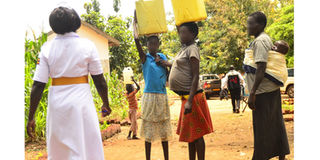Teenage pregnancies, HIV rates soar in Mbale

Expectant. Teenagers in Palabek Ogili Village in Lamwo District on August 31. Teenage pregnancies are on the rise in Mbale District, something that is worrying the authorities. PHOTO BY KELVIN ATUHAIRE
What you need to know:
- Threatening. The Mbale District authorities say the increase in teenage pregnancies and HIV/Aids infections among the youth is a time bomb.
Mbale District leadership is struggling to contain the increasing HIV/Aids prevalence among the youth, which has risen from 5 per cent in 2018 to 7 per cent this year.
The district coordinator for HIV/Aids programme, Mr Robert Wandwasi, says the data was generated by computing the number of youth who tested for HIV/Aids at each health centre. The district has 60 health centres and a population of about 250,000 youth.
“Of the 100 youth who tested, seven were found positive and this is worrying,” Mr Wandwasi says.
The teenage pregnancies in the district have also increased from 10 per cent last year to 20 per cent among girls of between 12 and 16 years.
This is highlighted in a new survey conducted by the Ministry of Health in partnership with Compassion International, a Christian humanitarian organisation, in May this year.
The new developments have attracted mixed reactions from stakeholders, residents and local leaders in Bugisu Sub-region.
Mr Wandwasi explains that the increase in teenage pregnancies and HIV/Aids infections among the youth is a time bomb.
Mr Wandwasi says despite all regions registering a decrease in HIV prevalence, the eastern region, where Mbale is one of the business hubs, registered an increase from 4.1 per cent to 5.2 per cent.
He attributes the increasing HIV infections and teenage pregnancies to early sexual engagement among the youth between the age bracket of 15 and 25 years.
“Ten per cent of the youths in Mbale District go into sex before the age of 18 years and majority do not know how to use a condom,” he says.
The district health officer, Mr Jonathan Wangisi, says the HIV/Aids increase among adolescents is slowly affecting the gains they had made in the prevention of the virus.
“We are concerned as the district and we are calling for concerted efforts to reverse the figures so that we save our children,” he says.
He, however, attributes the increase in teenage pregnancies and HIV infections partly to failure by the parents to provide for their children.
“The boda boda operators and other mature rich men are targeting young girls in secondary schools and they provide them with knickers and pocket money, which the parents have failed to provide,” he says, adding that this is also responsible for increased school dropout.
Uganda Youth and Adolescents Health Forum (UYAHF) records indicate that 45 per cent of the girls dropped out of school in Mbale District in 2018 due to early marriage and teenage pregnancies.
Mr Wangisi says in Mbale District, Busiu Town Council is ranked highest with the number of teenage pregnancies standing at 40 per cent followed by Nakaloke Town Council, which stands at 20 per cent.
Mr Patrick Mwesige, the executive director of UYAHF, says there is need for quick intervention to reduce teenage pregnancies among girls.
“But on those who are already child-mothers should be provided with free services of family planning methods such as condoms and also tested for HIV/Aids,” he says.
Mr Mwesige says they have partnered with Hunger Project, a non-governmental organisation, to spearhead a campaign to fight against HIV/Aids and teenage pregnancies in the district.
Mr Steven Masike, the coordinator of Makerere University, Mbale branch, says the increase in new HIV infections among adolescents is due to poverty and ignorance.
“Boda boda riders should not be blamed alone because even teachers are responsible for teenage pregnancies, especially among the pupils they teach. Many of the teachers, out of ignorance, engage in defilement,” Mr Masike says.
He adds that the mushrooming hostels in Mbale Town have also provided a fertile ground for prostitution.
Ms Salama Munsi, working with Reproductive Health Uganda in Mbale Branch, urges the government to empower young mothers with vocational skills such that they can continue supporting their children.
“The young mothers need to be empowered with vocational skills such as tailoring and hair dressing, among others. They can be able to raise their children,” she says.
Mr Bernard Mujasi, the district chairperson, attributes the increase in teenage pregnancies to early drinking, early operation of cinema halls and the increased number of disco halls.
“As a district, we are going to engage political leaders to pass bylaws against cinema halls and early drinking,” he says.
Mr Mujasi asks parents to ensure that girls complete the education cycle without any hindrance.
Interventions
Mr Emmanuel Ainebyona, the senior public relations officer in the Ministry of Health, says the current HIV prevalence in the country is 6.0 per cent.
Records from the Ministry of Health indicate that the new infections in the country are at 53,000 while deaths stand at 23,000.
The ministry also indicates that Uganda currently has 1.3 million people living with HIV/Aids and has lost an estimated two million people to HIV over the last three decades.
“We need to get the new infections to below 23,000 people to say HI/Aids is no longer an epidemic,” Mr Kenneth Mwehonge, the programme manager at Coalition for Health Promotion and Social Development, says.



